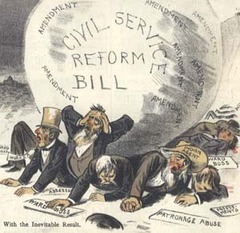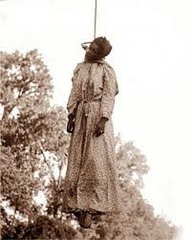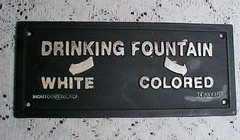Unit 6 flashcards
Unlock all answers in this set
Unlock answersquestion
The spoils system
answer
spoils system the practice of a successful political party giving public office to its supporters.
question
The assassination of James Garfield
answer
Garfield's assassination was instrumental to the passage of the Pendleton Civil Service Reform Act on January 16, 1883. Garfield himself had called for civil service reform in his inaugural address and supported it as President in the belief that it would make government more efficient. It was passed as something of a memorial to the fallen President. Arthur lost the Republican Party nomination in 1884 to Blaine, who went on to lose a close election to Democrat Grover Cleveland.
question
pendleton act 1883

answer
The Pendleton Civil Service Reform Act (ch. 27, 22 Stat. 403) of United States is a federal law established in 1883 that decided that government jobs should be awarded on the basis of merit instead of political affiliation
question
new south
answer
The term "New South," coined in 1874 by Atlanta Constitution managing editor Henry W. Grady, refers to the economic shift from an exclusively agrarian society to one that embraced industrial development
question
jim crow laws
answer
Jim Crow laws were state and local laws enforcing racial segregation in the Southern United States. Enacted after the Reconstruction period, these laws continued in force until 1965.
question
grandfather clause
answer
A grandfather clause (or grandfather policy) is a provision in which an old rule continues to apply to some existing situations while a new rule will apply to all future cases. Those exempt from the new rule are said to have grandfather rights or acquired rights. (illiterate whites could vote, not blacks)
question
lynchings

answer
is the practice whereby a mob--usually several dozen or several hundred persons--takes the law into its own hands in order to injure and kill a person accused of some wrongdoing. The alleged offense can range from a serious crime like theft or murder to a mere violation of local customs and sensibilities
question
plessy v. ferguson (1896)

answer
(1896) plessy v. Ferguson, 163 U.S. 537, was a landmark United States Supreme Court decision upholding the constitutionality of state laws requiring racial segregation in public facilities under the doctrine of "separate but equal".
question
booker t washington
answer
A former slave. Encouraged blacks to keep to themselves and focus on the daily tasks of survival, rather than leading a grand uprising. Believed that building a strong economic base was more critical at that time than planning an uprising or fighting for equal rights. Washington also stated in his famous "Atlanta Compromise" speech in 1895 that blacks had to accept segregation in the short term as they focused on economic gain to achieve political equality in the future. Served as important role models for later leaders of the civil rights movement.
question
w.e.b. dubois
answer
One of Washington's harshest critics, believing that Washington's pacifist plan would only perpetuate the second-class-citizen mindset. He felt that immediate "ceaseless agitation" was the only way to truly attain equal rights. As editor of the black publication "The Crisis," he publicized his disdain for Washington and was instrumental in the creation of the "Niagara Movement," which later became the NAACP (National Association for the Advancement of Colored People). He eventually grew weary of the slow pace of racial equality in the United States and renounced his citizenship and moved to Ghana in 1961, where he died two years later. Served as important role models for later leaders of the civil rights movement.
question
causes of american industrialization
answer
-natural resources -immigration -inventions -war created need for production -tariffs/land grants were supported by gov't
question
transcontinental railroad
answer
1869- rr companies received land and loans for each mile of track laid. economic changes -raw materials easier to get -new markets -industry could dominate market -nationwide industries -trade w Asia -growth of west
question
economies of scale
answer
the more you make, the less it will cost you to make, so you can sell things in bulk and for cheaper
question
corporate consolidation/monopolies
answer
merger and acquisition of many smaller companies into much larger ones
question
vertical integration
answer
legal, controlling all aspects of production
question
16) horizontal integration
answer
A company takes over other companies of the same kind of product to remove competition (favored by John D. Rockefeller)
question
Trusts
answer
Form of a monopoly where groups of corporations are run by a single board of directors; large scale business combination
question
Capitalsim vs. Socialism
answer
Capitalism: Economic system is controlled by private owners for profit Socialism: Economic system is controlled by the government; social ownership and democratic control of production
question
19) The Sherman Antitrust Act (1890)
answer
First federal action against monopolies, it was signed into law by Harrison for trust-busting. However, it did more harm against labor unions than trusts, which could find loopholes around the act.
question
) holding company
answer
A company whose primary business is owning and controlling shares of stock in other companies (vertical integration).
question
Social Darwinism
answer
A social theory which states that the level a person rises to in society and wealth is determined by their genetic background. Herbert Spencer: "Survival of the Fittest"
question
Laissez Faire
answer
idea that government should play as small a role as possible in economic affairs.
question
Andrew Carnegie: The Gospel of Wealth (1889)
answer
Andrew Carnegie: Gospel of Wealth (1889) Advocated philanthropy: duty of the wealthy to donate money to help with economic inequality (libraries)
question
) The Knights of Labor (1869-1890s)
answer
socialist labor group that allowed the admittance of African Americans. Called for basic reform like shorter work days, better wages, etc. Remained small because they generally accepted anyone (except the Chinese). Big thing to know is that it allowed skilled and unskilled workers to join.
question
Yellow dog contracts
answer
Contract that if an employee signed it, they promised not to join a labor union.
question
Blacklisting
answer
A blacklist is a list or register of people who, for one reason or another, are being denied a particular privilege, service, or mobility.
question
craft/trade unions versus industrial unions
answer
Craft Union: organized labor union that seeks to unify workers of the same craft or trade Industrial Unions:
question
The Railroad Strike of 1877
answer
Railroad workers throughout the U.S. went on strike to protest the lowering of their salaries; when more than a hundred people died during violence related to the strike, Hayes used federal troops to suppress the uprisings (Pinkertons)
question
Anarchism
answer
people against gov
question
The Haymarket Affair (1886)
answer
Someone threw a stick of dynamite in Chicago, killing and injuring people and police officers. Blame was lumped onto anarchists and led to the end of the Knights of Labor and growing suspicions towards labor unions, despite them having nothing to do with the incident.
question
The Pullman Strike (1894)/ The American Railway Union/ Eugene Debs
answer
Boycott. Many of the Pullman factory workers joined the American Railway Union (ARU), led by Eugene V. Debs, which supported their strike by launching a boycott in which ARU members refused to run trains containing Pullman cars.
question
Samuel Gompers
answer
Image result for american federation of labor definition The American Federation of Labor (AFL) was a national federation of labor unions in the United States. It was founded in Columbus, Ohio, in May 1886 by an alliance of craft unions disaffected from the Knights of Labor, a national labor association
question
The Old immigration vs. The New immigration
answer
This Term applies to those migrating from Western and Eastern Europe. They were the largest group of immigrants that migrated to the United States. The largest group of approximately three million, came from Germany in the 1840s and 1850s. Next came the British, Scottish, and Welsh immigrants, which totaled 2 million. In addition, one and a half million traveled over from Ireland. All of these immigrants came over in search of jobs and of new economic opportunities. vs. New Immigrants A new wave of immigrants, from eastern and southern Europe, frightened Americans because of the emigrant's customs, different faiths, illiteracy, and poverty.They were a new group of immigrants coming into the United States that consisted of Italians, Slavs, Greeks, Jews, and Armenians. They came from both Southern and Eastern Europe, and also from the Middle East. In the 1890s, their numbers first began to increase, and the numbers continued to increase for the next three decades. Most of the immigrants came from peasant and poor backgrounds and boosted America's foreign-born population by 18 million. They were often discriminated against.
question
Reasons for nativism against New Immigrants
answer
the new immigrants in the U.S. began to pose a threat to the "natives" because of their unknown languages and cultures. Some feared that the foreigners would outnumber them and eventually overrun the country. This hostility rekindled the spirit of European religious wars, resulting in clashes between the Protestants and Catholics. Some nativities formed this party in New York called the "Order of the Star Spangled Banner". The members refused to indentify themselves and would say they know nothing. They were an anti-Catholic group, until it subsided and slavery became the focal issue. Immigrants were helping to form the U.S. into one of the most ethnically and racially diverse societies in the history of the world
question
tenements/ Jacob Riis: How the Other Half Lives
answer
How the Other Half Lives: Studies among the Tenements of New York was an early publication of photojournalism by Jacob Riis, documenting squalid living conditions in New York City slums in the 1880s
question
American Protective Association (
answer
Nativist organization that attacked "New Immigrants" and Roman Catholicism.
question
bosses
answer
machines provided jobs and services for votes from immigrants and the poor. (Tammany Hall with "Boss" Tweed)
question
Gilded Age
answer
age of corruption
question
social gospel
answer
Social Gospel Protestant church movement that sought to end social injustice and promote progressiveness based on Christian teachings and later insistence for churches to tackle burning social issues. Majority that promoted it were Christian Socialists.
question
Jane Addams' Hull House
answer
Created by Jane Adams. Offered instruction in English, counseling to help new comers adapt to urban life, child-care services for working mothers, and cultural activities for neighborhood residents.
question
Bellamy
answer
Written in 1888. Socialistic book about a person that falls into a hypnotic sleep and wakes up in 2000. The protagonist finds that the social and economic injustices have melted under an idyllic government that has nationalized big business to serve public interest. Was big because people were worried about trusts.
question
Woman's Christian Temperance Union
answer
Organized in 1874 to pioneer for temperance in response to increased liquor consumption after the Civil War.
question
Conspicuous Consumption
answer
Conspicuous Consumption A showy display of wealth for social prestige
question
Reservation Policy
answer
forced them to live there. Used by the federal government in an attempt to pacify Native Americans and federal Indian agents that were supposed to supply the Natives with things in compensation for living on the reservation were usually corrupt.
question
Sand Creek Massacre (1864
answer
Colonel J.M. Chivington massacred four hundred Native Americans who had thought they were promised immunity
question
The Indian Wars (1865-1900)
answer
Clashes between Native Americans and Americans in the West. Consists of Battle of Little Bighorn, Custer's Last Stand, Wounded Knee Massacre, Sand Creek Massacre, reservation policies. Ended because the sword-and-fire policy of the whites extinguished the spirit of the Natives and the railroad only brought more and more troops and settlers
question
Custer's Last Stand (1876)
answer
Colonel Custer tried to suppress Sioux Indians that had gone on a rampage because of gold seekers swarming into their land. Custer underestimated their numbers and his troops were wiped out at the Battle of Little Bighorn.
question
Ghost Dance Movement
answer
Ceremony where Native Americans envisioned the return of Buffalo and elimination of the whites (attempt to preserve culture). Made many Americans and the government upset.
question
Wounded Knee Massacre (1890)
answer
In December 1890, Army troops captured some of Sitting Bull's followers and took them to a camp. 300 Sioux men, women, and children were killed
question
Assimilation Policy/Boarding School movement
answer
U.S. made Native Americans send their children to boarding schools and made to speak English, Native Americans were given individual plots of land to farm than hunt.
question
The Dawes Severalty Act (1887)
answer
The Dawes Severalty Act (1887) A federal law intended to turn Native Americans into farmers and landowners.
question
Homestead Act (1862)
answer
Act that allowed a settler to acquire as much as 160 acres of land by living on it for 5 years, improving it, and paying a nominal fee of about $30
question
Yellowstone National Park (1872
answer
Established in 1872 by Congress, Yellowstone was the United States's first national park
question
U.S. Fisheries Commission (1871)
answer
A federal bureau established in 1871 that made recommendations to stem the decline in wild fish. Its creation was an important step toward wildlife conservation and management.
question
John Muir/ The Sierra Club (1892)
answer
Dedicated itself to preserving wilderness of the western landscape.
question
The Turner Thesis (1893
answer
Frederick Jackson Turner argued that the frontier experience molded both the region and nation and the national character had been uniquely shaped by the westward expansion.
question
The safety-valve theory
answer
i that if things were really bad economically, you could move out West for opportunities (building RR, mining, ranching, farming). Didn't really happen much because cities kept good wages to keep people in and many didn't know how to farm or ranch anyway.
question
Populism Problems of farmers in the late 1800s
answer
The political doctrine that supports the rights and powers of the common people in their struggle with the privileged elite Railroads increased production and made farmers' products cost less money; higher shipping rates by railroads; high storage rates to store food; Panics of 1873 and 1893;
question
Grange Movement (1870s)
answer
Sought to bring farmers together to share techniques and elect state legislatures favoring their programs
question
Farmer's Alliance (1880s)
answer
Organization in the South that established stores and banks for farmers (excluded African Americans despite them being predominantly part of sharecropping)
question
Granger Laws
answer
State laws that regulated railroads worked until it was ruled that railroads were part of interstate commerce and fell under the jurisdiction of Congress, not state legislatures.
question
Interstate Commerce Act and Commission
answer
First attempts by the federal government to regulate railroads and required railroads to publish their rates
question
Cooperatives
answer
Groups of local farmers who work together to buy feed, fertilizers, and seeds, and to store grain.
question
Populist Party and Platform
answer
Party that wanted stronger government roles in the economy and usually was filled with farmers. They wanted a graduated income tax, inflation of currency for poor farmers, and "free silver" (william jennings bryan). They wanted direct election of senators and government ownership of railroads, telegraphs, and telephones.
question
Coxey's Army (1894)
answer
Panic of 1897 urged Jacob S. Coxey and his men to demand that the government relieve unemployment by an inflationary public works program. Arrested for walking on the grass.
question
Silverites vs Goldbugs
answer
Silverites were usually farmers or debtors that wanted a switch to silver in order to help pay off their debts and stood with William Jennings Bryan while Goldbugs wanted to keep the gold standard and stood behind William McKinley
question
Cross of gold
answer
Populist-Democratic Candidate William Jennings Bryan gave this speech in order to advocate towards free silver to bring about the bimetallism on gold and silver (16:1). Won him the ballot.
question
Election of 1896
answer
Election of 1896 Republican William McKinley defeated Democratic-Populist "Popocrat" William Jennings Bryan. 1st election in 24 years than Republicans won a majority of the popular vote. McKinley won promoting the gold standard, pluralism, and industrial growth.
question
The McKinley Tariff (1890)
answer
Boosted rates in response to increased revenue because of the "Billion-Dollar Congress" and angered many farmers.
question
Bessemer Process
answer
cheaply by blasting hot air through melted iron to quickly remove impurities. Made making steel easier and made it stronger; Andrew Carnegie used it for his steel process.
question
Company Town
answer
Company Town Community whose residents rely upon one company for jobs, housing, and shopping
question
Progress and Poverty (Henry George)
answer
Written by Henry George (economist) who criticized vast resources and land controlled by the elite; argued for "single tax" on land values.
question
Horatio Alger
answer
Wrote stories about people who are born poor and grow up to become super rich; "rags to riches"
question
Carrie Nation
answer
Husband died of alcoholism and she and her partners would destroy bottles of alcohol with hatchets and used violence.
question
Century of Dishonor by Helen Hunt Jackson
answer
Told the story about the experiences and injustices Native Americans face; 188
question
Long Drive
answer
Texas cowboys brought herds to railroad terminals/cow towns (Abilene, Dodge City, etc)



